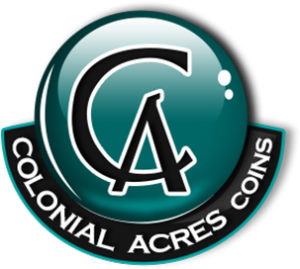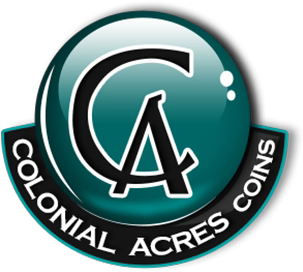Last updated on May 2nd, 2024 at 03:31 pm
Last Updated on May 2, 2024 Posted by Colonial Acres Coins
As a coin collector, few things can be more frustrating than acquiring counterfeit coins. Fortunately, there are a number of simple tests that you can use to help determine whether a coin is legitimate. By learning how to detect counterfeit coins, you can educate yourself and take steps to protect your collection.
At Colonial Acres, we are dedicated to helping you spot fake coins and can provide you with a wide range of resources to help you in your quest. From examining the weight and sound of a coin to checking its surface details, there are many things you can do to protect yourself. So, don’t delay – start learning today and safeguard your collection from perils like counterfeit coins!
Using the Properties of Precious Metals To Detect Counterfeit Coins
Con artists trying to make money selling fake coins will not go to the expense of investing in genuine gold or silver for their products (or might only plate an item with a thin layer). Here are three techniques based on the properties of precious metals that you can use for spotting fake coins.
Magnet Test
Precious metals are nonmetallic. This means that if a coin supposedly made of gold or silver sticks to a magnet, its primary ingredient is steel or iron. Be aware, however, that other metals such as copper are also non-metallic, so a suspicious coin that passes the magnet test could still be counterfeit.
Pinging Test
The pinging sound that gold and silver coins make when they hit a hard surface is one of the joys of numismatics. Experienced collectors are so familiar with the pitch and duration of a genuine coin’s ring that they can instantly detect counterfeit coins by sound. Newer collectors who do not yet have an ear for it can use genuine coins and online recordings for comparison.
Specific Gravity Test
The specific gravity of a substance is the ratio of its density to the density of water. Each type of metal has a known value. For example, gold’s specific gravity is 19.3, and silver’s is 10.49. Here is how to test a coin for its specific gravity:
- Weigh the coin.
- Fill a container with distilled water and place it on the scale.
- Use a thin thread to suspend the coin in the water.
- Record how much the weight of the water increases and divide that number by the weight of the dry coin. Your answer is the coin’s specific gravity.
XRF Machine
You may not wish to apply all of the above tests to your precious coins, but there is another reliable option: take the coin to a dealer with an XRF machine and scan the item. The XRF uses X-ray fluorescence technology to analyze th
e coin’s chemical composition without damaging it. In seconds you will know what your coin is made of!
Finding Essential Resources
The internet is full of good and bad information, and part of being a savvy coin collector is knowing the difference between the two. Here are some reliable sources where you can research historical prices, view examples of genuine coins, and find other helpful information.
Professional Coin Grading Servi
diclofenac for sale online in the best USA pharmacy https://ibmpractitioner.us/wp-content/uploads/2025/10/html/diclofenac-for-sale.html no prescription with fast delivery drugstore
ce
PCGS hosts a website filled with extensive free and reliable information. Its resources include an online coin encyclopedia, free e-books, reports on the coins the service has graded, and informational videos.
Numismatic Guaranty Company
NGC is another coin-grading service that seeks to educate customers through its website. Its four resources of special interest include the following:
- Grading scale that explains the coin grading system.
- Coin grading guide that describes various series of American coins.
- Coin explorer section that provides details of almost every coin ever minted in America.
- Section on counterfeits
Canadian Coin News
Canadian Coin News focuses on the unique issues surrounding Canadian money. This magazine has been around for 40 years and features editorials and tips useful to currency collectors.
Charlton Guidebooks
Hobbyists from many fields recognize Charlton Press as the authority on all things collectible. Besides coin guidebooks, they also publish price guides on paper money, collectible cards, clocks, dolls, and figurines. For your convenience, Colonial Acres offers Charlton Press price guides for sale on our website.
Know the Market
A word of advice: if a deal seems too good to be true, it probably is. Use the resources above to look up the real value of rare coins in various grades. If the price of the coin you’re being offered seems off, be cautious. Not everyone on the internet can be trusted. Stick to established dealers and auctioneers to buy coins – like Colonial Acres.
Protecting Yourself From Counterfeit Coins With Colonial Acres
Knowing how to detect counterfeit coins is an essential part of the art of coin collecting. Colonial Acres is a trusted name in collectible currency and can be an important ally in your search for genuine products. Our staff is happy to answer your questions and help with your research. Contact us today, we love to talk about coins!




